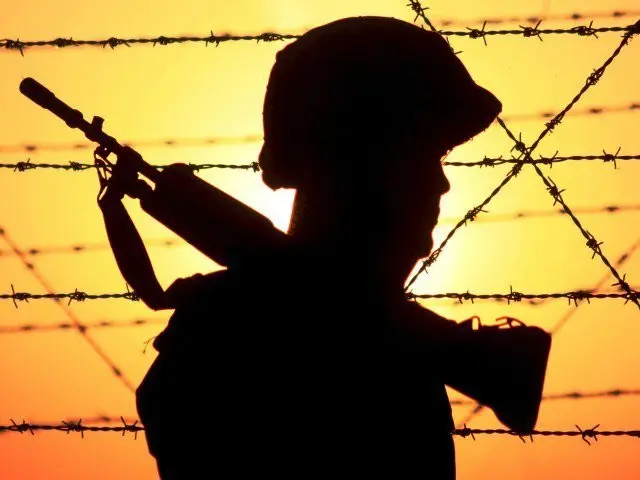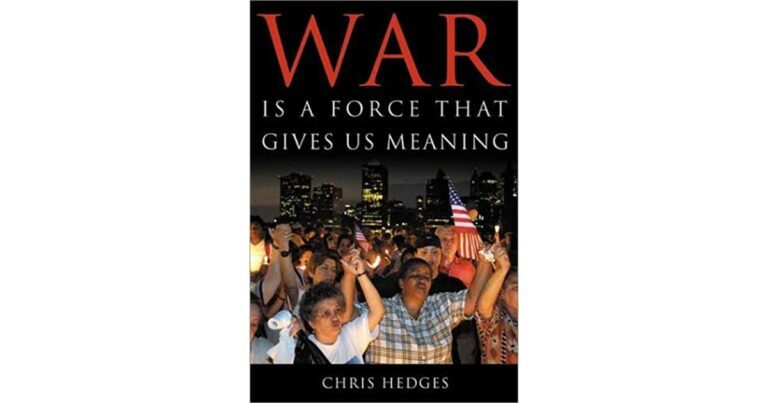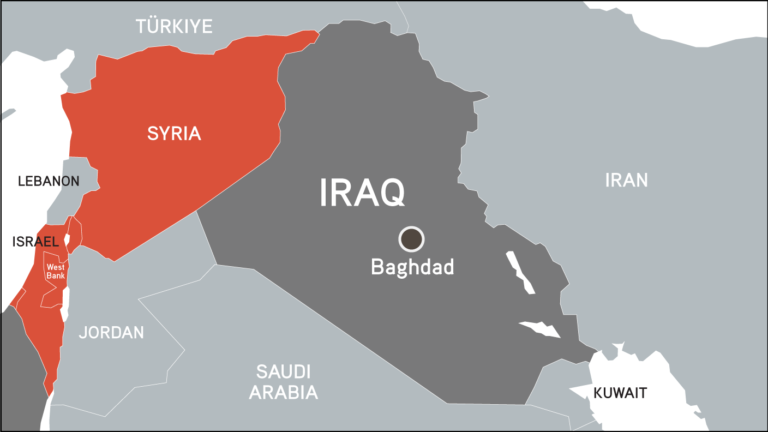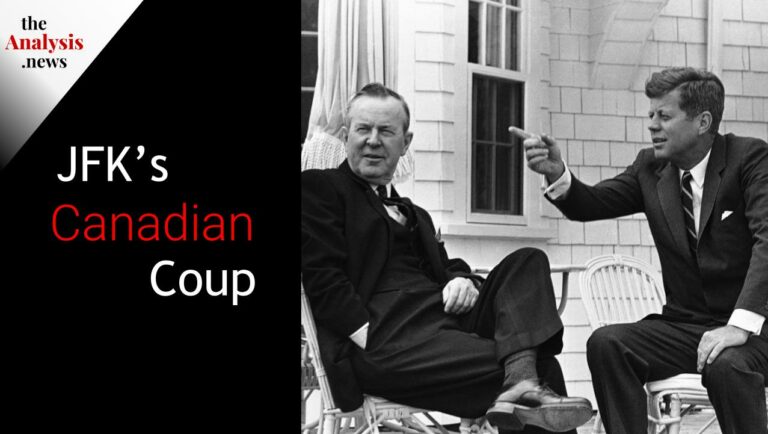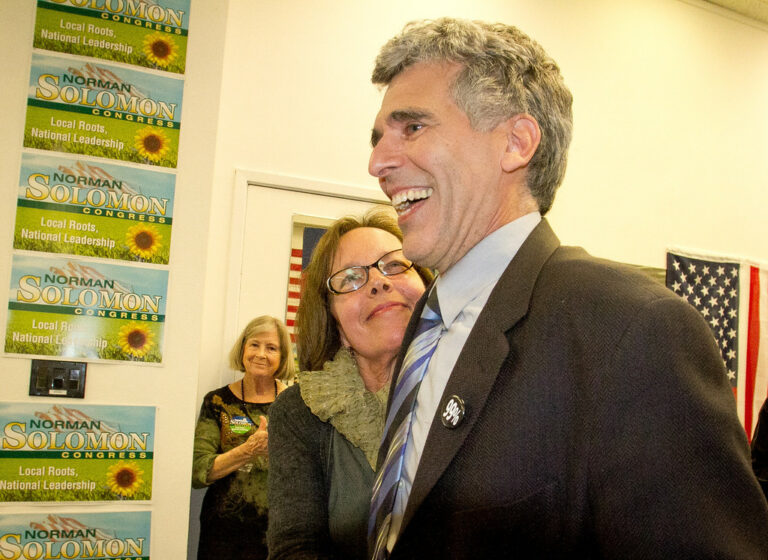Phil Donahue died on August 18, 2024. Mr. Donahue says he believed he was blessed, living in the greatest country on earth – but through hosting his show and speaking to people like Chomsky and the Black Panthers, he came to question what he had thought was true. This is an episode of Reality Asserts Itself, produced on September 30, 2014.
PAUL JAY, SENIOR EDITOR, TRNN: Welcome to The Real News Network, and welcome to Reality Asserts Itself. I’m Paul Jay.
Our guest today is probably someone that helped create this show in a sort of way, Phil Donahue. He’s not just a legend in broadcasting. He’s one of the more important figures politically, I think, at least in terms of media. There’s very few people in American media that stand up and stick their neck out and take a risk and even suffer the consequences for it. Well, Mr. Donohue’s one of those people. And it’s a privilege for us for him to join us here.
Thanks very much.
PHIL DONAHUE, TV TALK SHOW HOST: Pleasure, Paul.
JAY: So here’s a little bit of introduction. Phil Donahue’s an Emmy Award-winning media personality. He’s best known as the creator and host of the Donahue Show, which ran for 29 years on cable TV and I think was the longest-running talk show on TV, or still is. Still is? That’s a funny way to phrase it. It is not on the air anymore, but it’s still the longest running. Nobody has caught up to you yet, I believe.
DONAHUE: To my knowledge. I’m not sure.
JAY: So Wikipedia says, anyway. He also was the host of Donahue, which ran from July 2002 to March 2003, before msnbc canceled it because of his vocal opposition to the 2003 U.S. invasion of Iraq. This was despite it being the most highly rated show at the time on msnbc network. He’s also the codirector of Body of War, a documentary film about the struggles of an Iraq War veteran and antiwar activist, Tomas Young.
So, for those of you at home that don’t know, although I think most of you that watch do know, we usually start with a personal segment, and that’s what we’re going to do with Mr. Donahue, kind of more about what helped shape his view of the world. And then we’ll talk about his views on more recent events.
So you’re born in 1935 in Cleveland.
DONAHUE: I was.
JAY: You sort of come of age, consciousness of sorts, about nine, ten years old. I think that’s about at the end of one war and the beginning of another. It’s not very long before the Cold War begins, with McCarthyism and House Un-American Activities Committee.
DONAHUE: Right.
JAY: What was the politics of your household like?
DONAHUE: We weren’t desperately political. My parents certainly supported Roosevelt, although I recall my mother leaned Stevenson.
But I was totally American. I thought we were the best in all things. I thought I was blessed. I lived in a country that stopped Hitler’s advance in Russia. I didn’t really understand the help we had from Russian soldiers, but it was America who defeated Hitler and it was America who defeated the Japanese after Pearl Harbor. I wore a bill that said “Remember Pearl Harbor”. My uncle was in the Battle of the Bulge. And I was a member of the one true church. I was Catholic. I was not only Catholic; I was Irish Catholic. So I’m born—by accident, at birth I’m born in the greatest nation on earth that wins everything, all its wars, is all good in all things—the Marshall Plan, Lend-Lease. And I’m a member of the one true church. Holy cow.
JAY: So this is deeply part of your identity.
DONAHUE: Absolutely, in the ’40s, yes, when my wheels began to turn.
And I came of age really in the ’50s. My Notre Dame college days extended from 1953 to 1957. I wasn’t really savvy to McCarthyism till later. And I carried this superiority to my college education.
And then, around ten years later—I’m a slow learner, I have to say. I’m not proud of this. I remember I had a Ohio State University professor on my program for something I don’t remember, on my television program. We were a local show in Dayton, Ohio. We began in 1967. And I remember I’m in the green room talking to him, and we must have been—we were probably talking about the war or something. And he said there’s not a professor at Ohio State who supports this war.
JAY: Vietnam.
DONAHUE: Yeah. And that stunned me. I mean, at least this is how I remember it.
JAY: And how old are you?
DONAHUE: Well, let’s see—’35, ’45, ’55, ’60—I’m 30.
JAY: So the official—.
DONAHUE: Or 29, 30. Twenty-eight, probably.
JAY: The rah-rah American narrative is still your narrative.
DONAHUE: I’m suddenly thinking—yes. And I’m thinking, are we going to lose a war here? This can’t be. Eisenhower, the ’50s, I mean, MacArthur, Roosevelt. And suddenly this guy from Ohio State.
And after a while I looked up to suddenly realize that in many ways I was prepared for a world that never materialized. Nobody told us they were going to assassinate our president. Nobody told us we were going to lose a war. Nobody told us the Japanese were going to overtake us in automotive superiority. All of—and then the cities began to explode. The whole civil rights movement began violently. And in the first year we were on the air, 1968—we premiered in November ’67. Nineteen sixty-eight, Bobby is assassinated, Martin is assassinated, and the cops beat up the kids in Chicago at the convention.
JAY: So what does that do to you?
DONAHUE: Well, first of all, we’re doing shows on all of this. I mean, we were smart enough to grab these issues.
JAY: But you’re learning as you go.
DONAHUE: Oh, my. And then I had Noam Chomsky on my program.
JAY: Actually, hang on for sec. We’re going to show little clip of Noam Chomsky on Phil’s show, ’cause Noam gives this analysis of the media. And you can see—you’re not sure whether Phil looks a little skeptical or not at this, and it’s interesting to—I want to hear you talk about that moment. So here’s just a minute or so of Chomsky.
~~~
[Source: Pozner/Donahue]
NOAM CHOMSKY, LINGUIST AND POLITICAL COMMENTATOR: Now, in order to maintain those contacts, you’d better present the world a certain way, or those contacts are going to be cut off. You’ll lose your opportunity to appear to have special insight, to have leaks, to be able to come across with a story a couple of hours before the next person, and so on. Now, there’s an interplay here which requires power in order to maintain your own power. That’s another factor over and above the just structural and institutional properties.
DONAHUE: Go along to get along.
~~~
JAY: What was that sounding like to you at this time?
DONAHUE: Well, I was rattled. You know, I didn’t—at this time I wasn’t aware of the importance of dissent and how American it was. And I sure didn’t know the pushback that you got if you dissented. I was totally naive. But I remember saying to Chomsky, what are you trying to say? In some inelegant way like that. And he looked right at me and he said, never ever trust the state. And I’m thinking, what? I mean, I grew up in a church that prayed for America, prayed for the conversion of Russia.
JAY: It to some extent blessed the war in Vietnam,—
DONAHUE: Absolutely.
JAY: —and even blessed the dropping of the atomic bomb.
DONAHUE: And absolutely so. And Catholics voted for Nixon. And so I’m beginning to—my wheels are starting to turn. I mean, really I’m ashamed to admit how long it took.
But I also look back and realize how really blessed I was, really. I mean, if I were in the junior training program at Sears, I would never have been exposed to Black Panthers, to Louis Farrakhan, to Noam Chomsky. I mean, I was a very lucky man. I got an education available at no university.
JAY: It’s also interesting that you could actually put people like that on your show back then,—
DONAHUE: Right.
JAY: —’cause on mainstream media, there’s very few shows that would even dare to have those kinds of guests today.
DONAHUE: Well, we’re very proud of that history, and it is born out of my awareness that Dayton, Ohio, was not the crossroads of America. This is where we began as a local television show in November 1967. And so I concluded the only way we were going to—and we were visually dull. We had two talking heads. And we’re competing with Monty Hall, who’s giving away $25,000 to a woman dressed like a chicken salad sandwich and the spinning wheels, “Come on down!” and people screaming. And here I am talking to a guest, one guest per hour. So for that reason we put on Madalyn Murray O’Hair, for example, for our first—a Baltimoran: there is no God, there’s no heaven, there’s no hell, there are no angels. You know, my God, I mean, the building fell in in Dayton, Ohio. But everybody knew there was this show on.
JAY: And what about you yourself listening to this? I mean, you grew up in the one true church.
DONAHUE: Well, that’s true. It wasn’t easy. Locally we were—thankfully, we were local, so my mother couldn’t see this in Cleveland, where I was raised.
But I was fascinated by the questions she raised. You can worship a pet rock. I don’t care what you do. But you pay for it! I’m tired of paying higher taxes because you get tax benefits because of your so-called church. I mean, she would just—. And she was a guest—. You know, nobody goes for a beer during a hockey fight, and nobody left the Donahue show when Madalyn was on the program. And in many ways I admired her. I agreed with her. I don’t think you should have a crucifix on the wall of a public school.
JAY: Now, you’re now opening yourself, in terms of considering, exploring, thinking, ideas that challenge everything that goes to the core of who you were.
DONAHUE: True.
JAY: So—.
DONAHUE: Well, remember, I don’t want to fail on the air here. And, by the way, the ratings went through the roof. No one had ever seen anything like this. We put a gay guy on on the third show.
JAY: Ordinary America wanted to hear these ideas.
DONAHUE: Women especially. I think, you know, ours was a mostly female audience, remember, 1967. And nobody was out in 1967. And I’m 16 years of Catholic education, including four in Notre Dame (I’m a graduate of Notre Dame University), where we were taught that we love the sinner but hate the sin, in the most—I later realized, a very condescending thing, in that the church was promoting homophobia more virulently than [any] other institution. And here comes this gay guy, and I am scared to death. I’m figuring they’re going to think I’m queer, which is what we called them then. And I remember going to high school with guys who wanted to beat up queers. I never wanted to beat up a queer, but I didn’t want to be with any queers. And now I got a queer right here on my program. And, of course, the phones are going crazy. The mail is coming in to the general manager. Mothers thought their children would catch it. Why are we aggrandizing this man? You know, you put him on television, it’s like there’s nothing wrong with being queer. I mean, this was how we—.
But the audience—the only thing that made us survive were two things. One, we were a local show. If we had started on the network, we never would have survived. Freedom is another word for nothing left to lose. We had no place to go but up. We couldn’t go down. We were already down. And sponsors canceled and we had a real pushback. But the audience was so large that even the blue suits, who were terrified—and I was, too. I thought my career would be in jeopardy if—you know. And sure enough, the third call on the gay show, the caller said, “How’s Phil look to you?”
JAY: So ’68, ’69, we’re now getting to the height of the Vietnam War, the height of the civil rights movement, assassinations of not just Martin but many leaders of the Black Panthers. And as you’re interviewing, you’re starting to become aware of what the state, as Chomsky says, is doing to the antiwar movement.
DONAHUE: Yeah.
JAY: So at what point do you say, yeah, what I grew up with ain’t the truth?
DONAHUE: Yes, I did start to see the warts in all the—you know, Chomsky helped me with this—in all the institutions, including my own church, and certainly my government.
But I still was hiding behind my job. I remember watching the American Friends Service Committee in Dayton. The Quakers would stand downtown every Tuesday at noon at 3rd and Ludlaw, downtown Dayton, Ohio, just silently—I’m not sure they even had signs—just to silently stand there to protest the Vietnam War. And I remember admiring them and wishing that I could join them, sort of, but not really wanting to. I had already begun to develop a kind of a lefty image, which is not what you want to have if you’re in media. And so I was able to say, well, I can’t do that, because I have to keep my—I have to walk down the center of every issue and never reveal.
As the years went by and the show became much more successful—it took a while, but we finally grew, and from Dayton, Ohio, we wound up in over 200 American cities.
JAY: You said something a little earlier—I still could kind of hide behind my journalism hat or face. There’s a point somewhere where you have to—I’m assuming the coin has to drop for you, where it’s, you know what? I actually agree with these guys. I’m not just interviewing them anymore.
DONAHUE: Right.
JAY: They’re actually more right than they’re wrong.
DONAHUE: Yes. I don’t know exactly. I was active in a protest against the construction of a church in our suburban Centerville, Ohio, neighborhood. And we argued that Jesus isn’t into stained-glass windows. We bused our kids. We sent our kids to a mostly black school downtown, where the paint was peeling off the walls. The textbooks were old, with Cardinal Spellman’s imprimatur. And I remember because our school, Catholic school in the suburbs, had Martin Luther King in them. But certainly there were no blacks. We felt Catholics were raising another generation of racists. We were very committed and very righteous, probably, if I recall.
JAY: Who’s “we”?
DONAHUE: The people who joined—the group with whom I was allied in, for example, the busing effort. We had to get a bus and we had meetings. People in our neighborhood thought we were going to sell to a black family, and we had to deal with that. And so my kids went downtown Dayton to St. James. We had black kids over to the house and scared everybody in the neighborhood. This would be—you know, you’re talking late ’60s, early ’70s. My show had just begun.
JAY: So were you concerned? There’s two things happening at the same time here. There’s the radicalization of Phil Donahue politically,—
DONAHUE: Yeah.
JAY: —and Phil Donahue is becoming a star. You’ve got what feels like a hit show coming here. And you must have known you might be getting a point where you might go on network, you might be going national. Is there a point where you have to decide, how far can I go, how can I stick my neck out?
DONAHUE: Well, remember, we were syndicated, which I came to understand and believe is the most honest way to distribute a television program. If they don’t like me in Peoria, I’m still on the air in Indianapolis, or vice versa. In other words, one vice president while he’s shaving can’t cut me off the network coast-to-coast, goodbye, never see you again. Each station that carried the Donahue Show made the decision on their own, by themselves, free of any—. Will this bring in revenue for us?
JAY: When you start the show, you would self-identify, to use the terminology, as a true-blue American. Then, by the end of the ’70s—I’m not saying you don’t consider yourself an American, but would you call yourself a progressive American? Have you kind of become, politically,—
DONAHUE: I guess so.
JAY: —that you’ve come to some conclusions?
DONAHUE: I never—I didn’t know—honestly, I never thought of conservative/liberal. I just didn’t. And again another evidence of my own slow learning here. I found these programs, these issues to be fascinating.
JAY: Well, maybe if you’d been a little more savvy, you wouldn’t have had the guts to put all these people on your show.
DONAHUE: That’s possible, you know? I enjoyed talking to Louis Farrakhan. I enjoyed discussing religion and more war caused by the Prince of Peace than in any other—how was religion involved in this, and how, you know, religion makes you feel superior. I remember as a child thinking, I’m glad I’m not Episcopalian. Why do I have these divisions? And if I think I’ve got God and you don’t, I can do terrible things to you.
JAY: And God loves America.
DONAHUE: Yeah. And I can patronize you. You know, I will say how much I love you, but I really don’t respect you, because I have God and you don’t. All of these attitudes and how they’re shaped. What jingoism is. And much later I learned about the First Amendment and the Jehovah’s Witnesses who wouldn’t salute, and became fascinated with that issue and how the Supreme Court, after coming down and saying, you’ve got to salute, and expelled kids that didn’t, came down and said, hey, this is—you obey your parents.
JAY: I’m going to do something, because, in short, you went on to have a fabulously successful show, you went on to make a lot of money, you met and knew the who’s who of America, and you particularly got to know, from the inside—and you didn’t grow up in the elite, but you got to know the American elite. And that’s what I want to talk to you about in the next segment.
DONAHUE: Very good.
JAY: Who are they? What do they want? Are they fit to govern?
So join us for the continuation of our discussion with Phil Donahue on Reality Asserts Itself on The Real News Network.
Podcast: Play in new window | Download | Embed
Subscribe Apple Podcasts | Spotify | Android | iHeartRadio | Blubrry | TuneIn | Deezer | RSS
Never miss another story
Subscribe to theAnalysis.news – Newsletter
Phillip John Donahue is an American media personality, writer, film producer and the creator and host of The Phil Donahue Show. The television program, later known simply as Donahue, was the first talk show format that included audience participation.




